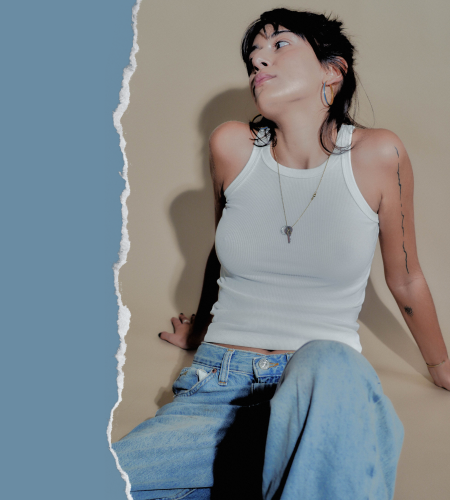
West Londoner Yaz León is ready to shake the industry up with her confrontational and brutally honest musical offerings.
Described in her press release as “a twenty-something woman documenting her human experience so far,” León’s latest drop “4th Wall” hears the Spanish-Iraqi artist join forces with fellow underground riser Bukky to deliver the hypnotic new release. Fusing delicate instrumentation with experimental vocal stylings, “4th Wall” questions identity and individual growth for an end-result which, according to the multi-faceted artist, feels “a little bit merciless.”
With “4th Wall” taking shape as a taster of León’s “more blunt, unhinged stuff” still to come in the future, it’s clear that Yaz León is ready to make her mark on the UK music scene – expect huge moves from this star in the making.
Read on for our exclusive chat with Yaz León on conceptualizing “4th Wall,” her process for fusing heavy lyricism with experimental and “fun” production, as well as why she feels there “isn’t the same respect or encouragement as male coworkers” for women in music.
SheBOPS: Could you elaborate on the meaning behind the title “4th Wall” and how it relates to the themes of disillusionment and questioning authenticity?
Yaz León: The title “4th Wall” refers to the film technique ‘breaking the fourth wall’ where an actor addresses the audience directly. In this way, the actor (me) is acknowledging that they are a performer in a play (society). This is a play I at least sometimes don’t enjoy being part of.
You describe “4th Wall” as a “help I’m spiraling” song – how did that state of mind influence the song’s lyrics and tone?
At the time, I was so, so angry. I heard somewhere that it’s better to write in a neutral mindset after an emotional event. Naturally, I ignored that, so it ended up a little bit merciless.
With the release being quite heavy and highly personal to your own views and experiences, what was the most challenging aspect of creating “4th Wall”?
Honestly, explaining it to myself, to my mum, to Bukky. Religious guilt and negative experiences in these spaces aren’t comfortable topics, and they aren’t things everyone will agree with. Unpacking that and using the right words to communicate everything was the hardest bit.
You also touch on the ways understanding or growth can sometimes be limited by traditionalism. How do you think traditionalism can affect the broader music industry and its evolution?
I think people confuse something old with tradition. My understanding is, old can be applicable and adaptable, tradition is just a set of rules that benefit specific people, and growth is change. Those people with that power aren’t going to want to listen to or understand change, as long as it jeopardises their power. The music industry is still stuck behind the tradition of viewing the artist as a product. A lot of labels seem to want a fully fledged artist in order to invest the minimum and milk the most. Loads of artists give up because the music industry becomes banking.
How do you approach songwriting when dealing with complex personal themes?
Honesty is best. Even if the truth sounds a bit weird or shit. Especially after the feelings you wrote about, pass and make you feel stupid. Even better. I love a good wallow.
Although the lyrical themes are quite heavy, you’ve described the beat as fun – what was the creative process like for making the beat? How do you balance heavy themes with an upbeat or fun musical style?
Every time Bukky comes around, I end up loving whatever we’ve done. We’re always sharing and experimenting with production techniques, free of judgement. When I showed Bukky the beat, they dove in straight away and made their verse completely their own. I think, in that sort of environment, it’s really easy to have fun regardless of the heavy lyrics; they’re not mutually exclusive.
“4th Wall” is lifted from your upcoming EP. What role does “4th Wall” play in the EP’s overall themes and messages?
“4th Wall” is a taster of less comedic lyrics and more blunt, unhinged stuff. The production is also a reflection of the more experimental approach I’ve started taking to my EP’s sonic identity.
As an up-and-coming singer-songwriter, how would you describe your experiences in the music industry so far from a female perspective?
Too few. I’ve felt both uninvited from certain spaces and avoidant because of ‘unprofessional’ and disrespectful experiences. In a way though, this let me meet some of my best collaborators and friends. I’ve met some of the most underrated and hard working women, partly, because we tend to group.
Do you think there is enough representation of women in the music industry, especially in leadership roles such as producers and executives?
Absolutely not. Not just because there are less women in these roles, but also because they don’t get the same credit. There isn’t the same respect or encouragement as male coworkers.
What do you think needs to change in order to make the music industry a safer and fairer place for women in music?
Apart from giving a bit more praise to female producers of the future + past: championing young women to choose leadership roles, creating grants directed at female producers/engineers/executives/writers, increasing female voters for awards, creating legislative protections to protect freelance workers from gender discrimination and harassment… to name a few.
“4th Wall” by Yaz León is out now.


